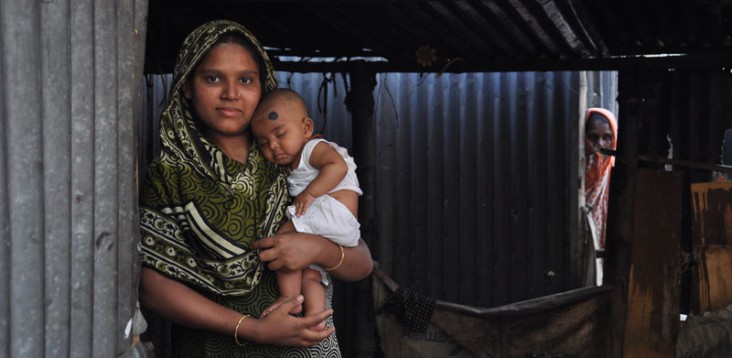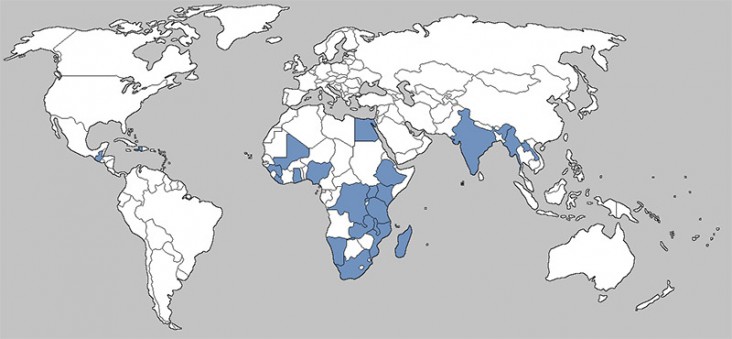- What We Do
- Agriculture and Food Security
- Democracy, Human Rights and Governance
- Economic Growth and Trade
- Education
- Ending Extreme Poverty
- Environment and Global Climate Change
- Gender Equality and Women's Empowerment
- Global Health
- Water and Sanitation
- Working in Crises and Conflict
- U.S. Global Development Lab

Awarded in 2014, the Maternal and Child Survival Program (MCSP) was announced as a multi-partner, flagship program in support of the U.S. Agency of International Development (USAID) priority goal of ending preventable child and maternal deaths (EPCMD) in a generation. MCSP’s work is evidence-based and results oriented.
MCSP has three strategic objectives:
- Support countries to increase coverage and utilization of evidence-based, high-quality reproductive, maternal, newborn, and child health (RMNCH) interventions at the household, community, and health facility levels.
- Close innovation gaps to improve health outcomes among high-burden and vulnerable populations through engagement with a broad range of partners.
- Foster effective policymaking, program learning, and accountability for improved RMNCH outcomes across the continuum of care.
MCSP engages governments, policymakers, private sector leaders, health care providers, civil society, faith-based organizations, and local communities in adopting and accelerating proven approaches to address the major causes of maternal, newborn, and child mortality and to improve the quality of health services from household to hospital. MCSP tackles these issues through approaches that incorporate health systems strengthening, household and community mobilization, and gender integration among other areas. MCSP supports programming in maternal, newborn, and child health; immunization; family planning and reproductive health; nutrition; health systems strengthening; water, sanitation, and hygiene; malaria; prevention of mother-to-child transmission of HIV; and pediatric HIV care and treatment.

Current MCSP activities take place in 23 countries worldwide,* and include the following partnerships and activities, among numerous others:
- The mPowering Frontline Health Workers partnership works to accelerate the use of mobile technology to improve the skills and performance of frontline health workers.
- The Every Newborn Action Plan identifies actions for improving newborn health outcomes. MCSP is a member of the steering committee.
- Under the Family Planning 2020 partnership, MCSP promotes accelerating access to postpartum family planning in Africa and Asia, most recently with a landmark meeting in 2015 resulting in action plans in 16 countries.
- The Ending Preventable Maternal Mortality (EPMM) working group includes numerous international partners. The World Health Organization published the EPMM Strategy in 2015.
- Numerous working group and advisory activities with Gavi, the Vaccine Alliance, support immunization for millions of children worldwide.
- The Integrated Community Case Management (iCCM) Task Force, managed by MCSP, promotes community-level management of childhood illness.
- The Survive & Thrive Global Development Alliancelliance brings together partners from governments, professional health associations, nonprofits, and the private sector to improve health outcomes for mothers, newborns, and children.
- Projects for Ebola infection prevention and control and the restoration of primary health services are underway in Guinea, Liberia, and Ghana.
- MCSP is a valued partner of the World Health Organization and contributes to the development of policy briefs to disseminate new WHO guidance, including postnatal care [PDF, 528KB] and preterm birth guidelines.
- As a member of Roll Back Malaria’s Malaria in Pregnancy (MIP) Working Group, MCSP advocates for the continued prioritization of key actions to accelerate MIP program implementation coverage and advance MIP prevention and control.
MCSP is a $500 million cooperative agreement extending from March 2014 to March 2019, led by Jhpiego in collaboration with Save the Children Federation, John Snow, Inc. (JSI), ICF International, Results for Development Institute, PATH, Population Services International (PSI), and CORE Group. Associate partners include Broad Branch Associates, Johns Hopkins Bloomberg School of Public Health, Communications Initiative, and Avenir Health.
To learn more about the Maternal and Child Survival Program, visit the program website.
* The 23 countries in which MCSP works are Burma, Democratic Republic of the Congo, Egypt, Ethiopia, Ghana, Guatemala, Guinea, Haiti, India, Kenya, Laos, Liberia, Madagascar, Malawi, Mali, Mozambique, Namibia, Nigeria, Rwanda, South Africa, Tanzania, Uganda, and Zambia. MCSP’s predecessor project, the Maternal and Child Health Integrated Program (MCHIP), has active awards in Bangladesh, Pakistan, South Sudan and Zimbabwe.







Comment
Make a general inquiry or suggest an improvement.